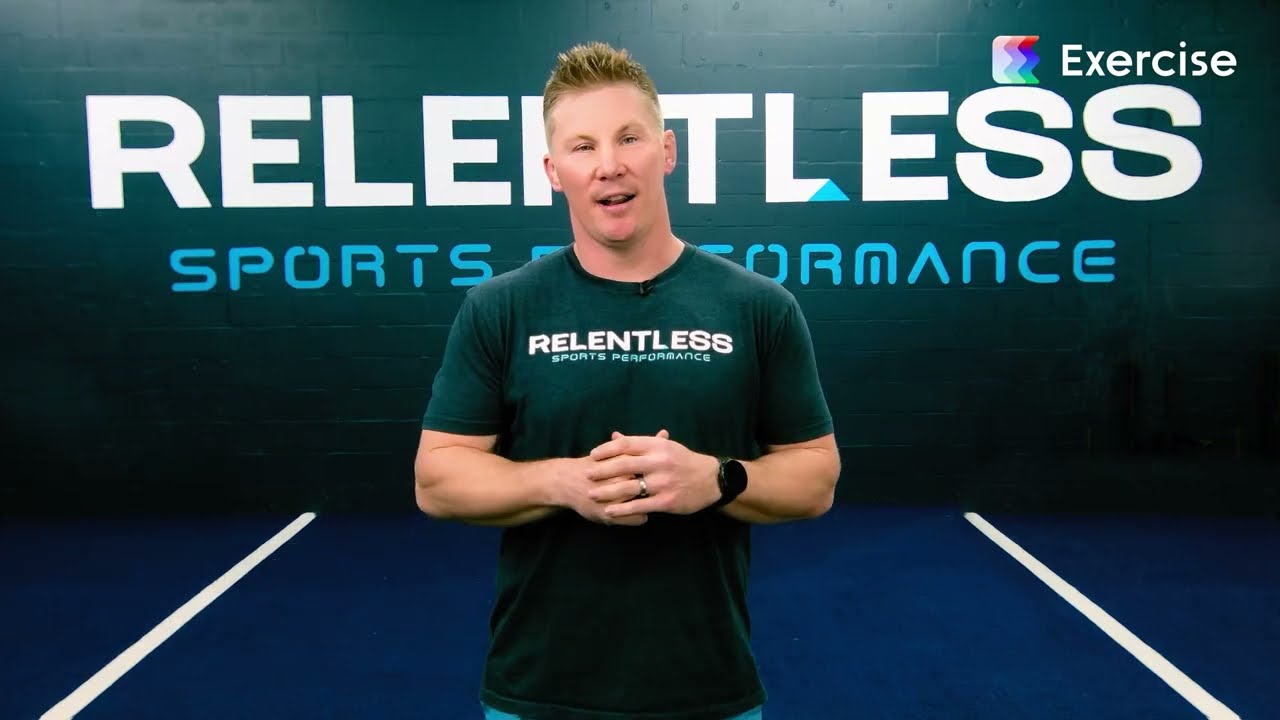How to Start a Fitness Coaching Business (Step-By-Step Guide)
Learn how to start a successful fitness coaching business with these detailed steps. From certifications to finding clients, we cover it all.

To start a fitness coaching business, you need to define your niche, create a business plan, and use the right tools to manage and grow your fitness coaching business effectively. Whether you’re focused on how to start an online fitness coaching business, build a fitness coaching program, or create an in-person wellness coaching brand, success begins with a structured plan and the right resources. Exercise.com provides all-in-one software solutions with the best online fitness coaching software and the best apps for online fitness coaches to help you streamline your operations, manage clients, and scale your business, making it the best choice for fitness professionals.
Below, we’ll break down the key steps to help you understand how to start a fitness coaching business from scratch, build an online fitness coaching business model, and grow into a sustainable, profitable fitness coaching brand. If you want to learn how to become an online fitness coach then starting an fitness coaching business is an excellent way to turn your passion into a fulfilling career, and Exercise.com is here to support you on this exciting journey. As the leading provider of the best gym management software, the best personal training software, and even the best business software for fitness influencers, we offer the tools and resources you need to launch and grow your fitness coaching business with confidence.
Starting a fitness coaching business requires expertise, dedication, and a strong support system. Exercise.com provides a comprehensive gym management software solution that empowers you to offer online coaching, track client progress, and provide personalized training programs. Our software makes it easy to connect with clients, deliver high-quality coaching, and start a fitness business to establish yourself as a trusted fitness professional.

Ready to take the leap and start your fitness coaching business? Book a demo with Exercise.com today, and let us show you how our all-in-one gym management software can help you succeed. From client management to program delivery and marketing, we’ve got you covered every step of the way. Don’t wait any longer to pursue your passion for fitness and make a positive impact on the lives of others.
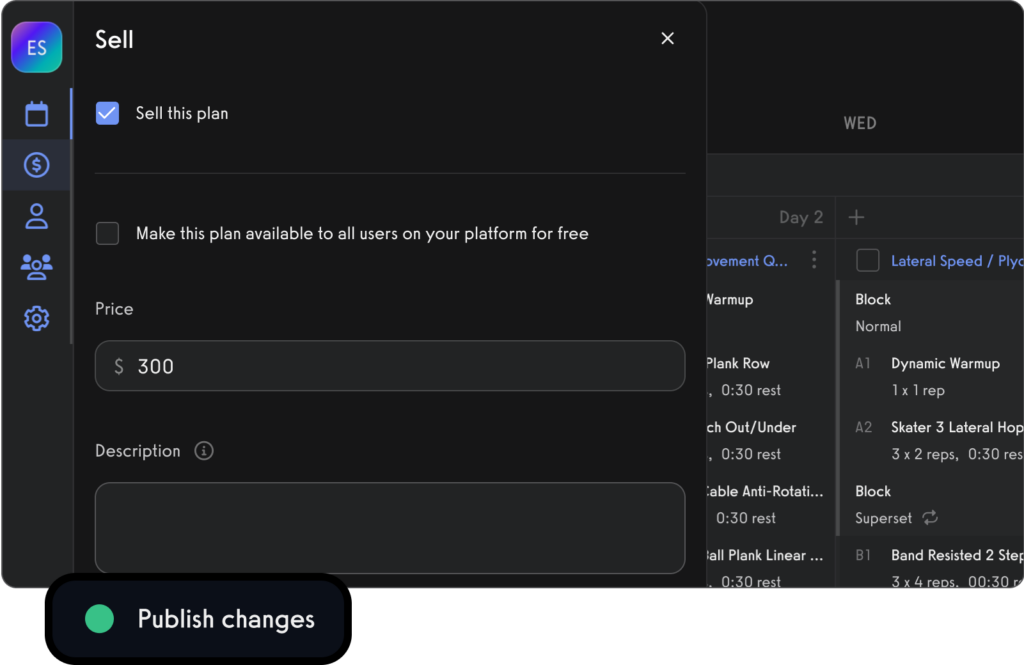
Run online fitness challenges.
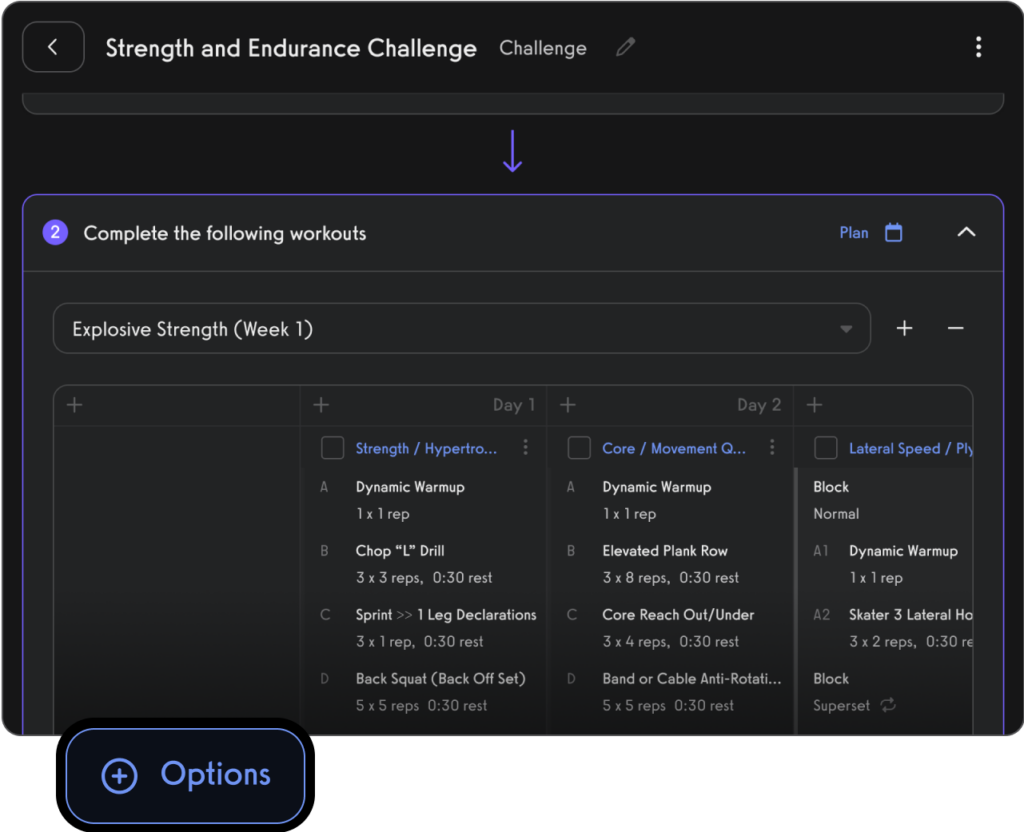
Create and sell fitness memberships, products, and digital offers.
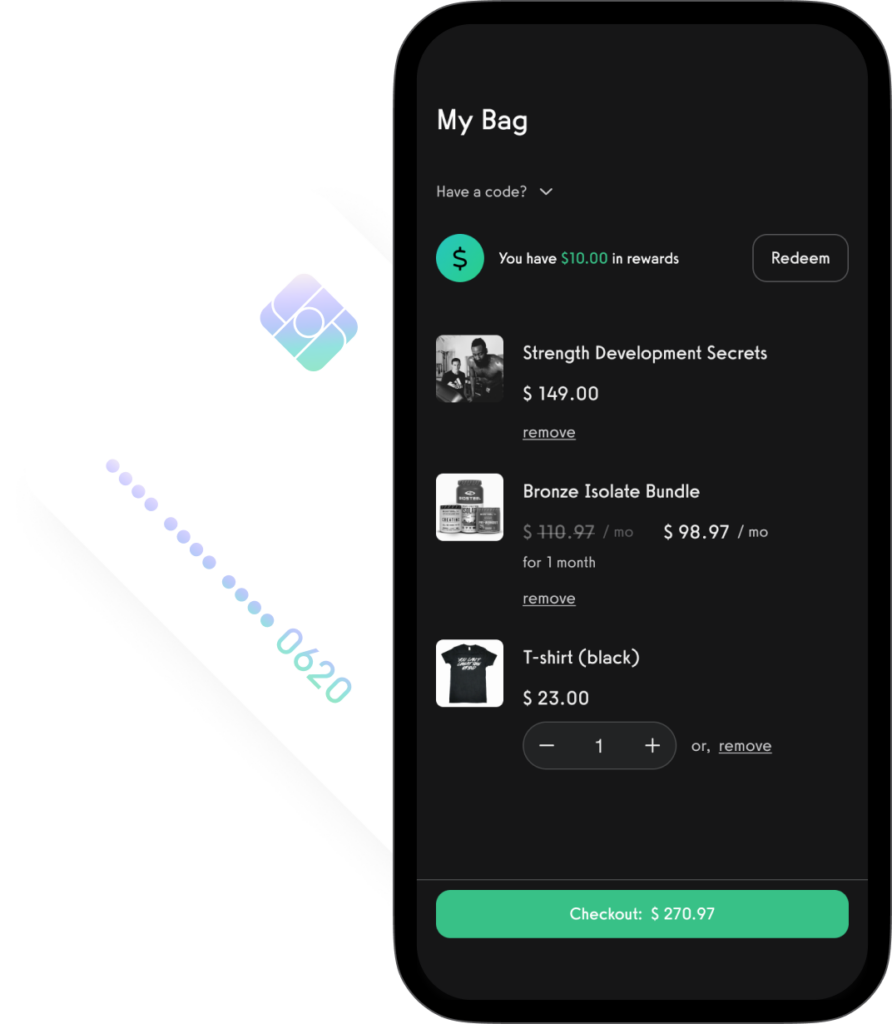
Manage, message, and market to your online personal training clients and leads.
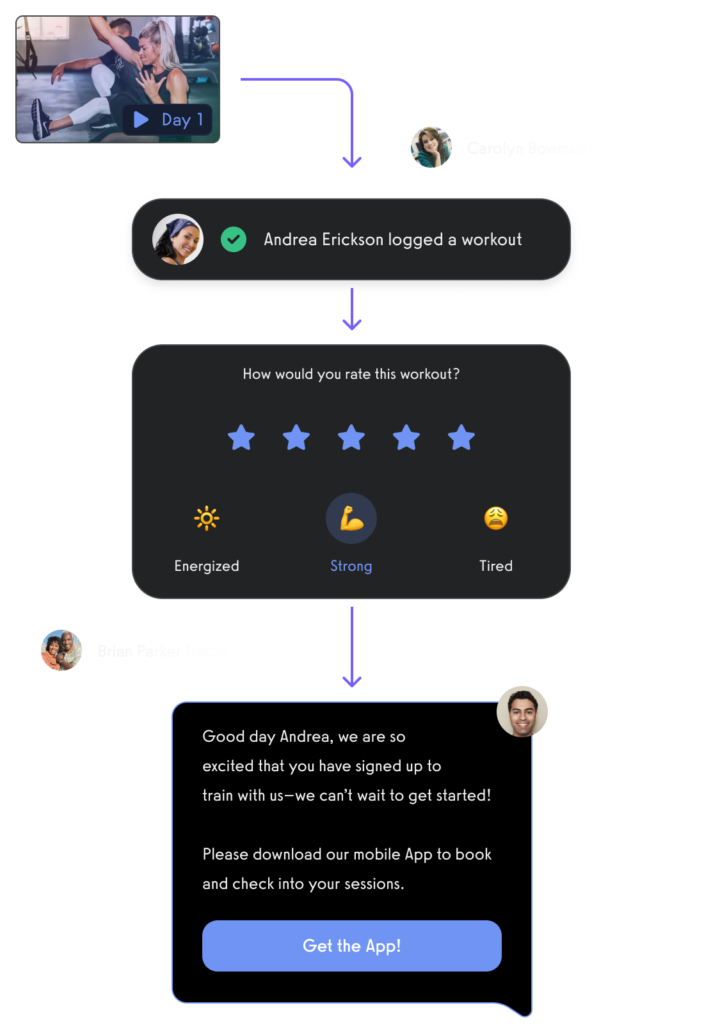
All from your very own custom branded fitness apps.

Be sure to also check out our guide on how to start an online personal training business. There are many ways to make money from fitness—from learning how to make money as a fitness influencer to simply getting started making money selling workout programs online—there are personal trainer career options galore for online fitness coaches willing to put in the time and effort to grow a successful online fitness coaching business and make money as a fitness coach online.
In this competitive field, having a robust support system is key, which is where Exercise.com comes in. Offering the best gym management software and best personal training software (with the best online fitness coaching software and the best software for fitness influencers all in one!), Exercise.com provides an all-in-one platform to manage your online fitness coaching business efficiently, enhance client engagement, and drive growth.
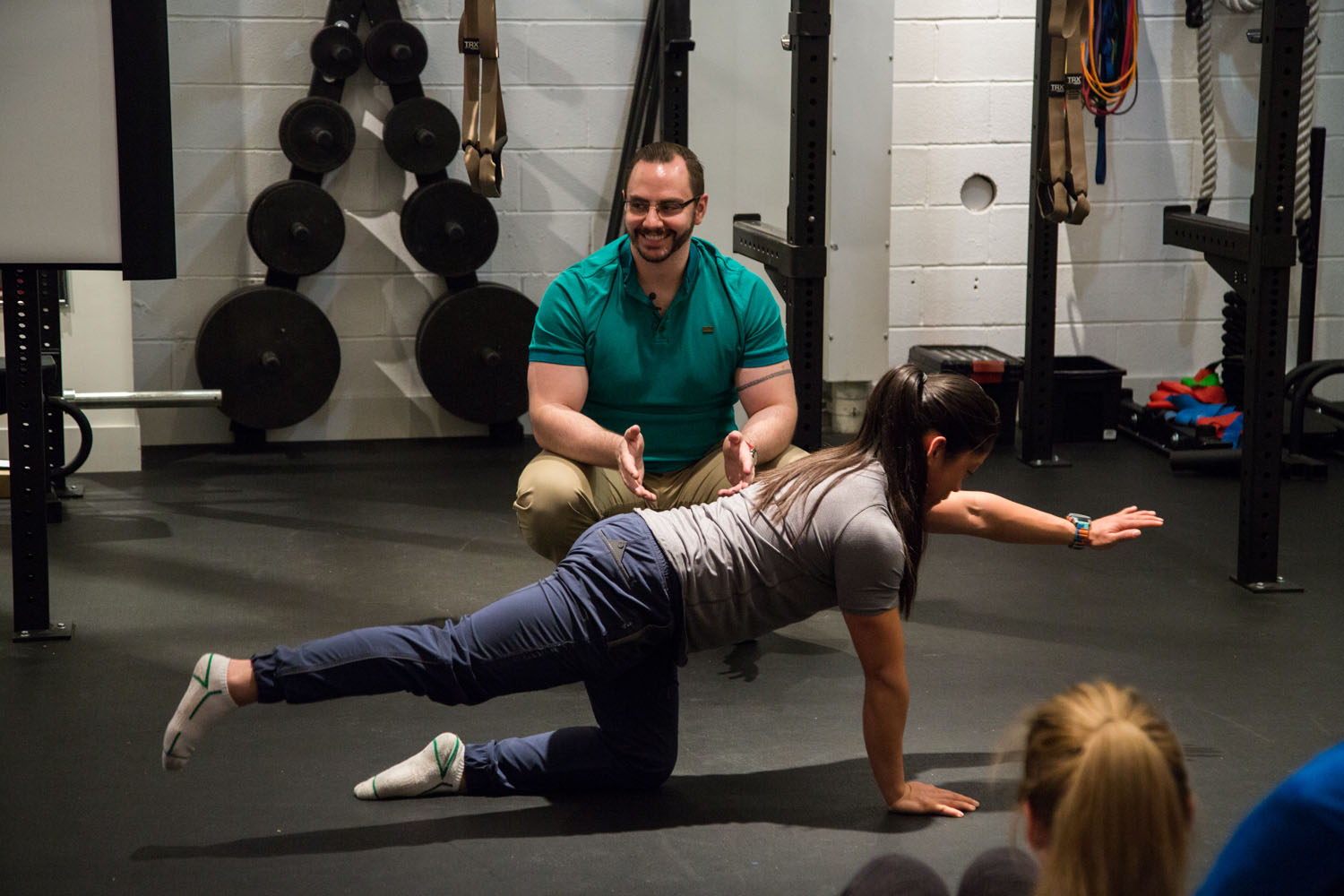
Step #1 – Define Your Online Fitness Coaching Niche and Target Market
Identifying your online fitness coaching niche is the cornerstone of a successful fitness coaching business. Your niche helps differentiate your brand and attracts the right clients, whether you focus on weight loss coaching, strength training, wellness coaching, or virtual fitness coaching.
- Evaluate your expertise: Are you skilled in weight loss coaching, strength training, or rehabilitation?
- Identify your audience: Who are your ideal clients? (e.g., busy professionals, new moms, or athletes)
- Research trends: What services are in demand in the fitness industry or your area?
By narrowing your focus, you position yourself as an expert in a specific field, which helps when determining how to start a health coaching business from home or designing a niche fitness coaching program.
Choosing the best fitness coaching certification is crucial for anyone looking to start or elevate their career in the fitness industry. The best personal training certifications can help present you as an expert fitness coach that can command premium fitness coaching prices.
To ensure your business resonates with clients, consider how to set up an online fitness coaching business tailored to their unique needs. For example, starting a nutrition coaching business or building a virtual fitness coaching platform might attract a specific audience looking for convenience or expertise. Additionally, understanding how to start a weight loss coaching business can help you cater to a broader demographic.
Fitness professionals who specialize in niche areas, such as exercise coaching or fitness consultancy, often find it easier to market their services. Whether you’re targeting corporate wellness programs, postnatal clients, or athletes, honing in on your niche builds authority and trust in the fitness industry.
Using Exercise.com’s best online fitness coaching software, you can customize your client portal, schedule specialized programs, and offer a seamless experience to clients within your chosen niche.
Step #2 – Create an Online Fitness Coaching Business Plan
A solid online fitness coach business plan is critical to starting and growing a successful business. It outlines your goals, strategies, and financial projections to ensure long-term sustainability.
Key Elements of Your Plan:
- Business goals: Define what success looks like for your business.
- Revenue model: Decide if you’ll offer one-on-one coaching, group classes, or fitness consulting online.
- Marketing strategy: Outline how to attract and retain clients.
- Operational plan: Plan for scheduling, billing, and program delivery.
A comprehensive plan helps you determine how to become a fitness consultant, navigate industry challenges, and scale efficiently.
When crafting your online fitness coach business plan, don’t forget to include scalability. For example, designing a hybrid model that combines fitness coaching solutions and fitness consulting companies can provide steady revenue while allowing for growth into online services. You can also learn from how to create a gym business plan and our gym business plan template, personal trainer business plan template, and fitness business plan template. Also, use the free online fitness coaching contract template to make sure you have your paperwork buttoned up (and with the Exercise.com platform, you can easily send waivers, invoices, assessments, and more with e-signatures and automations built right in).
Additionally, factor in client retention and long-term growth strategies. Knowing how long it takes to build a fitness coaching business helps you set realistic milestones and goals, especially when you’re focusing on how to start online coaching fitness or how to become a fitness coach online.
The Exercise.com platform integrates scheduling, billing, and program delivery tools into one system, making it easy to manage and grow your business while staying organized.

Step #3 – Build Your Online Presence
When starting an online fitness coaching business, a strong online presence is essential. Your website and social media platforms are often the first places potential clients will interact with your brand.
Must-Haves for Your Online Presence:
- Professional website: Include your services, client testimonials, and an easy way to book a consultation.
- Social media strategy: Use Instagram, Facebook, and TikTok to showcase client success stories and workouts.
- Email marketing: Keep potential and current clients engaged with regular newsletters.
Your website and social media platforms should reflect your expertise and highlight the unique services you offer. For instance, share content like how to start a health coaching business from home or how to start a fitness coaching business from scratch to demonstrate your value.
Building authority through blog posts, like “What is a fitness coach?” or “How to become online fitness coach,” can drive traffic to your website and attract potential clients. Ensure your messaging aligns with your goals, such as explaining how your fitness coaching program or fitness coaching solutions address client needs. The harder you work, the more you can make. Don’t be limited by average online fitness coach salary stats, because when stop exchanging time for money, then if you have the right tools, you can serve an almost unlimited number of online fitness coaching clients.
With Exercise.com, you can create a branded fitness coaching app and client portal to streamline onboarding, deliver programs, and foster engagement, helping you manage and grow an online coaching business.
Read More:
Step #4 – Develop Online Fitness Coaching Programs and Services
Your services are the foundation of your online fitness coaching business. To succeed, offer flexible, high-quality options that cater to various client needs.
Examples of Coaching Services:
- One-on-one coaching: Personalize workouts and nutrition plans.
- Group coaching: Foster community and reduce costs for clients.
- Hybrid coaching: Combine in-person sessions with virtual offerings.
- Online fitness programs: Create scalable, pre-recorded programs for passive income.
Expanding your services into areas like how to start an online weight loss business or fitness consulting online can diversify your offerings and help you reach more clients. For instance, a program tailored to seniors or youth athletes could be a game-changer in a crowded market.
For those considering how to become a successful online fitness coach, creating bundled programs for nutrition, exercise, and wellness can set your business apart. This approach appeals to clients who are searching for a one-stop solution for their health and fitness needs.
Understanding how much you should charge as a fitness coach is important too.

The table below shows the average prices people typically pay for online fitness coaching as well as the average fitness coaching price ranges, but to make money as an online fitness coach and run a successful and profitable online fitness coaching business, you will typically want to charge more than the average online fitness coach prices.
| Type of Online Fitness Coaching | Estimated Price Range (/mo) | Average Price (/mo) |
|---|---|---|
| Individualized Training Plan | $50-$200 | $125 |
| Group Training Program | $20-$100 | $60 |
| Fitness Challenge | $10-$50 | $30 |
| Nutrition Coaching | $50-$200 | $125 |
| Wellness Coaching (Fitness + Nutrition) | $100-$300 | $200 |
| Lifestyle Coaching (Fitness + Nutrition + Life Coaching) | $200-$500 | $350 |
| Personal Training Sessions (Virtual) | $30-$100 | $65 |
| Hybrid Coaching (Online + In-person) | $200-$500 | $350 |
Please note these average online fitness coaching prices are estimated averages and can vary greatly. Some or the most profitable fitness business models even charge much higher prices (ex: high ticket fitness coaching).
Use the Exercise.com software platform to create and deliver custom fitness coaching programs, monitor progress, and communicate with clients all in one place.
Step #5 – Market Your Online Fitness Coaching Business
To attract online fitness coaching clients, you need a strong online fitness coach marketing strategy that emphasizes the unique value you provide. Whether you’re focused on how to market online fitness coaching or growing a virtual fitness coaching client base, effective marketing is key.
Marketing Tactics:
- Social proof: Share client transformations and testimonials.
- Paid ads: Invest in Google Ads or social media ads to reach your audience.
- Partnerships: Collaborate with other fitness professionals or wellness brands.
- Content marketing: Write blogs or make videos on topics like how to start a weight loss coaching business or exercise coaching tips.
Marketing a fitness coaching team or showcasing your role as a fitness business coach can differentiate your brand from competitors. Use SEO-friendly content with the best fitness keywords for SEO, like articles on how to market online fitness coaching or guides on fitness consulting companies, to establish credibility and attract leads.
Exploring niche-specific strategies, such as targeting clients searching for fitness advisor roles or those interested in starting a nutrition coaching business, can expand your reach. Remember to highlight your unique selling points and provide valuable resources for clients considering business coaching for fitness professionals.
Leverage the Exercise.com platform’s marketing integrations to automate email campaigns, track performance, and convert leads into paying clients.
Step #6 – Choose the Right Tools for Management
Running an online fitness coaching business requires tools that simplify your operations. From scheduling sessions to tracking client progress, having the right software ensures your business runs smoothly.
Why Exercise.com Is the Best Choice:
- Schedule and manage sessions effortlessly.
- Deliver branded programs to clients.
- Automate billing and payments.
- Monitor client progress with robust reporting tools.
Selecting the right management tools is essential for scaling your business. A platform like Exercise.com allows you to oversee every aspect of your operation, whether you’re learning how to set up online fitness coaching or managing a fitness consulting online brand.
When considering fitness consultant jobs or planning fitness coaching solutions, having tools that integrate seamlessly with your marketing, scheduling, and payment systems is critical. This ensures your clients enjoy a smooth experience while freeing up your time to focus on growth.
With Exercise.com, you get everything you need to launch, manage, and grow a thriving fitness coaching business.
Step #7 – Focus on Client Retention and Growth
Once you’ve started an online fitness coach business, maintaining strong client relationships is crucial for long-term success. Create a retention strategy that keeps clients engaged and ensures steady growth.
Strategies for Retention:
- Offer regular check-ins and progress updates.
- Introduce referral programs to incentivize client recommendations.
- Continue your education to stay updated on trends.
Focusing on client retention is vital for long-term success. Offer personalized feedback and regular updates to keep clients engaged, especially those in long-term programs like how to start a health coaching business or fitness coaching program memberships.
Incorporate strategies that reward loyalty, such as discounts for referrals or exclusive access to premium online fitness coaching business model services. These efforts ensure clients see the value in your business and are more likely to recommend your services to others.
The Exercise.com platform’s automation features and communication tools make client management seamless, allowing you to focus on providing exceptional service.
Start Your Fitness Coaching Business Today
Starting an online fitness coaching business or an in-person fitness consulting service is an exciting opportunity to impact lives and grow a profitable career. By following these steps and leveraging the all-in-one features of Exercise.com, you’ll set your business up for long-term success with software and online fitness business mentorship that can help you take your online fitness business plan from concept to reality.
Ready to take the next step? Book a demo with Exercise.com today and discover how our platform can help you launch, manage, and grow your fitness coaching business!

The Importance of Fitness Coaching
Health and fitness are increasingly becoming priorities for people around the world, and with this trend comes a demand for qualified fitness coaches. Fitness coaching is not just about helping clients achieve their physical goals; it’s also about providing motivation, accountability, and ongoing support.
As a fitness coach, you have the opportunity to positively impact your client’s lives by helping them make sustainable changes to their health and wellbeing. Fitness coaching has become especially relevant in recent times as people spend more and more time online.
A Brief Overview of the Steps to Starting a Fitness Coaching Business
Starting a fitness coaching business can be challenging, but with the right approach, it can also be incredibly rewarding. Here’s an overview of some of the steps you’ll need to take:
Research and Planning: This involves conducting market research to determine demand for your services in your area. You’ll also need to develop a business plan that includes your goals, target market, pricing strategy, and marketing plan.
Certifications and Training: Obtaining necessary certifications such as NASM or ACE is essential for establishing credibility as a fitness coach. You may also want to consider additional training in specialized areas such as nutrition or injury prevention.
Setting Up Your Business: This includes determining the legal structure of your business (sole proprietorship, LLC), obtaining any necessary licenses or permits required by law and setting up digital platforms like websites/social media accounts that will help promote your services. ; becoming a professional fitness coach takes dedication but offers great reward potential both financially speaking & from professional satisfaction.
Read More:
- How to Start a Fitness Business
- How to Name a Fitness Business
- Fitness Business Ideas
- How to Make a Fitness App
- Fitness App Name Ideas
Research and Planning
Conduct Market Research to Determine Demand for Fitness Coaching Services in Your Area
Before starting a fitness coaching business, it’s important to conduct market research to determine the demand for your services in your area. This will help you identify the potential customer base, as well as any competitors that you may face.
You can gather this information through surveys or focus groups to determine what services people are looking for and what they are willing to pay. Additionally, researching local gyms and health clubs can give you a better understanding of the types of services they offer.
Identify areas where they may be lacking or where you could provide unique services that set you apart from competitors. Look at online reviews of these businesses to see what customers like and dislike about their current experiences.
Once you have gathered all of this information, analyze it to determine if there is a demand for your proposed business in your area. Use this data to shape your business plan and determine whether or not it is viable.
Develop a Business Plan That Includes Goals, Target Market, Pricing Strategy, and Marketing Plan
A solid business plan is essential when starting a fitness coaching business. This should include goals that are specific, measurable, achievable, relevant, and time-bound (SMART).
Examples could include attracting 10 new clients per month or increasing revenue by 25% within six months. Identify your target market based on the research you conducted earlier on the demand for fitness coaching in your area.
Determine their age range, gender distribution, income level, etc., so that you can tailor your marketing efforts accordingly. Pricing strategy is another important aspect of starting a fitness coaching business.
Research local competitors’ pricing structures and consider offering competitive rates or unique services at higher prices. Develop a marketing plan using social media advertising platforms such as Facebook and Instagram which allow targeting specific demographics.
You can also consider traditional marketing, such as gym flyers or newspaper advertisements, to reach a wider audience. Ensure that your marketing message is consistent with the services and target market you have identified in your business plan.
Read More: High Ticket Fitness Coaching
Certifications and Training
Obtain necessary certifications such as NASM or ACE
One of the most important steps in starting a successful fitness coaching business is obtaining the necessary certifications. Most gyms and fitness centers require their trainers to hold at least one certification, if not more.
The two most widely recognized certifications in the industry are National Academy of Sports Medicine (NASM) and American Council on Exercise (ACE). Each certification has its own unique curriculum, exam, and continuing education requirements.
NASM is known for its focus on corrective exercise techniques and functional movement patterns. The certification process includes a comprehensive digital textbook, online video lectures, practice exams, and a final exam that measures knowledge of anatomy, physiology, assessments, program design, and nutrition.
ACE has a more broad-based approach to fitness training with an emphasis on behavior change coaching. Their curriculum covers exercise science principles as well as program design principles based on client needs.
Consider additional training in specialized areas such as nutrition or injury prevention
While obtaining a basic fitness certification is essential for starting a fitness coaching business, adding additional specialized certifications can give you an edge over your competition. For example, adding a nutrition certification can allow you to provide clients with personalized meal plans based on their individual needs which can help them reach their goals faster. Additionally, offering injury prevention programs can help clients avoid common injuries that could put them out of commission for weeks or even months.
Some other specialized certifications to consider include:
- Functional Movement Screen (FMS)
- Certified Strength & Conditioning Specialist (CSCS)
- Corrective Exercise Specialist (CES)
- Precision Nutrition Certification
- National Council on Strength & Fitness (NCSF)
Adding these specialty certifications not only increases your knowledge but also demonstrates your commitment to providing quality services to your clients. It can also increase your credibility in the industry and help attract more clients who are looking for a well-rounded fitness coach.
Setting Up Your Business
Determine the Legal Structure of Your Business
The legal structure of your business is a critical decision that will affect various aspects of your business, including taxes, legal protection, and management. The most common types of business structures are sole proprietorship, partnership, limited liability company (LLC), corporation, and cooperative.
Each has its benefits and drawbacks. Sole proprietorship is the simplest and most popular type for small businesses because it has no formalities or registration requirements.
However, it also has unlimited liability for debts and lawsuits. An LLC is another popular option because it provides limited liability protection to owners while allowing them to enjoy pass-through taxation like partnerships or sole proprietors.
In addition, an LLC offers flexibility in management structure without the formalities required by corporations. However, forming an LLC usually involves filing articles of organization with the state government and paying a fee.
Obtain Any Necessary Licenses or Permits
In addition to choosing a legal structure for your business, you may need certain licenses or permits based on where you operate and what services you provide as a fitness coach. Regulations vary by state and local government jurisdiction. For example, if you plan to operate a gym where clients come to work out with you in person regularly or offer group fitness classes in public spaces like parks or beach areas, you may need permits from local authorities.
Moreover, some states require personal trainers to hold specific certifications from recognized organizations like NASM or ACE before they can start coaching clients formally. To avoid any legal issues in the future that could potentially derail your new fitness coaching business before it even gets off the ground; do research on what licenses are required in your area beforehand.
Set up a Website and Social Media Accounts to Promote Your Services
Once you have chosen a legal structure for your business and obtained any necessary permits, it’s time to set up a website and social media accounts to promote your fitness coaching services. Your website should be professional, easy to navigate, and contain details about your fitness programs and services. You can also use your website as an e-commerce platform to sell digital products such as eBooks or workout plans.
Social media, especially Facebook and Instagram, are great platforms for building an online presence in the fitness industry. A strong social media presence will help you attract new clients while also allowing you to engage with existing clients better.
Make sure you post high-quality content regularly, including workout tips, motivational quotes, client testimonials, and pictures of yourself training or participating in fitness activities. Also consider paid advertising options on these platforms if it fits within your budget.
Setting up a fitness coaching business requires careful planning in terms of legal structure determination; obtaining any necessary licenses or permits; and establishing a strong online presence through websites and social media accounts. These steps are essential for laying the foundation of a successful business that can attract new clients and help establish credibility with current ones.
Finding Clients
Network with Local Gyms and Health Clubs to Offer Your Services
One of the best ways to find clients as a fitness coach is by networking with local gyms and health clubs. Many gym-goers are looking for personalized fitness coaching services, and partnering with these establishments can help you tap into that market.
Consider offering your services at these locations or even holding group classes or workshops to attract potential clients. When approaching gyms and health clubs, it’s important to have a clear pitch that highlights the benefits of working with a personal coach.
Emphasize your expertise in creating personalized workout plans, providing nutritional guidance, and offering ongoing motivation and accountability. Be sure to also discuss how you can work together with the gym or health club staff to create a comprehensive fitness program for their members.
Utilize Social Media Advertising and Targeted Marketing Campaigns
In addition to networking in person, social media can be an incredibly effective tool for finding new clients as a fitness coach. Platforms like Facebook, Instagram, Twitter, and LinkedIn offer targeted advertising options that allow you to reach potential clients based on their interests, demographics, location, and more. To get started with social media advertising as a fitness coach, consider creating eye-catching graphics or videos that showcase your services.
Highlight the benefits of working with a personal coach versus trying to navigate fitness on one’s own. Set up campaigns targeting users who have shown interest in topics like weight loss or muscle building.

Offer Free Trials or Discounts to Attract New Clients
Offering free trials or discounts can be an effective way of attracting new clients as a fitness coach. This strategy allows potential clients to experience your services without committing financially upfront.
Consider offering one free session or week-long trial before asking them if they would like to continue working together. Discounts are another way to incentivize potential clients to try your services.
Consider offering a percentage off their first month of coaching or a discount for referring a friend. These offers may bring in new clients who are hesitant about committing to higher-priced fitness coaching services.
Providing Services
Develop Personalized Workout Plans for Each Client Based on Their Goals and Abilities
One of the most important aspects of fitness coaching is creating a customized workout plan for each client that is tailored to their goals and abilities. This means that before starting any training sessions, you should conduct an initial consultation to understand what your client wants to achieve, any health concerns they may have, and their fitness level. After conducting the initial consultation, you can then create a personalized workout plan that includes exercises and routines that are specifically designed to help your client achieve their goals while keeping their abilities in mind.
The workout plan should be challenging enough to produce results but not so difficult that it leads to injury or discouragement. It’s important to remember that one size does not fit all when it comes to fitness coaching.
Each person has unique needs and abilities which must be taken into account when creating a personalized workout plan. By doing this, you can help improve your clients’ overall health and well-being while also building trust and loyalty with them.
Offer Nutritional Guidance and Support
Nutrition plays a crucial role in overall health and fitness. As such, as a fitness coach, you should also offer nutritional guidance and support as part of your services.
This means educating your clients about healthy eating habits, providing meal plans, and offering advice on supplements or other dietary needs they may have. To provide effective nutritional guidance, it’s important first to understand your clients’ individual dietary preferences, restrictions or allergies.
From there you can develop an appropriate meal plan based on their goals – whether it’s weight loss or muscle gain- while ensuring they are receiving the necessary nutrients for optimal performance. By offering this service alongside physical training sessions will enable your clients not only feel better but also perform better during workouts leading them closer to achieving their end goal faster than before.
Provide Ongoing Motivation and Accountability
Offering ongoing motivation and accountability is critical to the success of your client’s fitness journey. The journey can be challenging at times, and as a coach, you must provide the extra push needed to keep them motivated and on track. This is where accountability comes in – you should hold regular check-ins with your clients to ensure they are following through with their workout plans and nutritional guidance.
This can be done through weekly or bi-weekly meetings or even phone calls or messages. Moreover, providing reassurance and support when clients face setbacks is crucial in keeping them motivated throughout their fitness journey.
Celebrating milestones reached along the way also goes a long way in reinforcing positive habits that will lead to long-term success. By providing ongoing motivation and accountability alongside personalized workout plans and nutritional guidance, you can offer an all-inclusive service that will not only help your clients achieve their fitness goals but also create a strong sense of trust between them leading to referrals for more potential clients.
Growing Your Business
Continuously Evaluate Client Satisfaction and Adjust Services Accordingly
One of the keys to growing a successful fitness coaching business is to continuously evaluate client satisfaction and adjust services accordingly. This means actively seeking feedback from clients on their experience with your coaching, including the effectiveness of your workouts, your communication and motivation skills, and overall customer service. Take their feedback seriously and use it to identify areas where you can improve or make changes that will help you better meet their needs.
In addition to soliciting feedback, it’s important to regularly check in with clients throughout their fitness journey. This not only helps you monitor progress and adjust workouts as needed, but also provides an opportunity to build rapport and strengthen relationships with clients.
Consider sending occasional emails or messages asking how they’re doing, following up after a particularly challenging workout, or offering words of encouragement during times of stress or uncertainty. By keeping close tabs on client satisfaction and making changes as needed, you’ll be able to maintain a strong reputation in the fitness community while building a loyal customer base that trusts you as a coach.
Consider Expanding into Group Fitness Classes or Online Coaching Programs
As your fitness coaching business grows, consider expanding into other areas such as group fitness classes or online coaching programs. Group classes can be an effective way to reach more people at once while also providing a sense of community for participants.
You can offer classes at local gyms or even outdoors in public spaces like parks. Online coaching programs are another option for expanding your reach beyond your local area.
This allows you to work with clients from anywhere in the world using video conferencing software and other online tools. You can offer personalized workout plans, nutritional guidance, motivation, and accountability just as you would with in-person coaching sessions.
Before expanding into new areas like group classes or online coaching programs, make sure you have the necessary certifications and training to provide safe and effective services. You’ll also need to invest in marketing and advertising to promote your new services and reach a wider audience.
Overall, expanding into new areas can be a great way to grow your business and reach more people with your fitness coaching expertise. Just be sure to do your research, plan carefully, and stay committed to providing top-notch service every step of the way.
After following the steps outlined in this article, you should be well on your way to starting a successful fitness coaching business. Remember that it takes hard work and dedication to build and grow a business, but with a solid plan and commitment to your clients’ success, you can make it happen.
Recap of Key Points in Starting a Successful Fitness Coaching Business
First and foremost, research and planning are crucial to the success of your fitness coaching business. Understanding the demand for your services in your area, developing a comprehensive business plan, and obtaining necessary certifications will set you up for success.
Setting up your business is another important step. This includes determining the legal structure of your business, obtaining any necessary licenses or permits, and setting up an online presence through a website and social media accounts.
Finding clients is essential for growing your fitness coaching business. Networking with local gyms and health clubs, utilizing social media advertising, offering free trials or discounts for new clients are all great ways to attract new customers.
Providing top-notch services focused on personalized workout plans based on each client’s goals and abilities along with nutritional guidance will ensure client satisfaction. Ongoing motivation and accountability will keep them coming back for more.
Continuous evaluation of client satisfaction is crucial in growing your fitness coaching business. It’s important to adjust services accordingly based on feedback from clients.
Consider expanding into group fitness classes or online programs as ways to expand your customer base even further. Starting a successful fitness coaching business takes hard work but it is possible.
Follow these key points outlined in this article as guidelines for building a thriving enterprise that provides valuable service while also bringing personal fulfillment both financially as well as emotionally by helping people achieve their health goals.

How to start an online fitness coach business?
Starting an online fitness coach business involves several key steps: First, ensure that you have the appropriate certifications and a solid understanding of fitness and health. Second, decide on your niche based on your knowledge and interests. Third, create a business plan that outlines your services, target audience, pricing strategy, and marketing tactics. Fourth, establish an online presence through a website and social media. Finally, use a platform like Exercise.com to streamline client communication, programming, and progress tracking. Use the guide on this page to learn how to start a fitness coaching business online that you can be proud of, and that will generate profit for years to come! You can learn how to start a fitness coaching business from home if you are willing to put in the work.
How do I start a fitness instructor business?
To start a fitness instructor business, first, acquire the necessary certifications in your chosen fitness field. Secondly, determine your target market and the specific fitness services you will provide. Thirdly, develop a business plan that covers operational, marketing, and financial aspects. Fourthly, find a suitable location if offering in-person classes or set up an online platform for virtual sessions. Lastly, promote your business using various marketing strategies and tools.
How to start a fitness consulting business?
Starting a fitness consulting business involves gaining experience and expertise in the fitness industry, as well as obtaining any necessary certifications. Once these are in place, define your niche, create a detailed business plan, set up your business legally, and then market your services to your target audience. You could also use platforms like Exercise.com to help manage and grow your business.
Do online fitness coaches make money?
Yes, online fitness coaches can make money with fitness. The amount depends on various factors, including their experience level, the number of clients they manage, the specific services they offer, and their pricing structure. Some coaches may charge per session, while others might offer packages or subscription services.
How do I price my online fitness coaching?
Pricing for online fitness coaching should take into account your experience, the demand for your services, your operating costs, and the prices set by competitors. It’s crucial to strike a balance between setting a price that accurately reflects the value of your services while also remaining affordable for your target demographic.
How to start a personal training business with no money?
Starting a personal training business with no money can be challenging but possible. You can begin by offering online training or in-home training, which requires little to no startup costs. Another strategy is to leverage social media platforms to market your services and gain clients. Collaborating with other trainers or businesses can also help you gain visibility and attract clients.
What qualifications do you need to be a fitness instructor?
To become a fitness instructor, you need a high school diploma or equivalent and a certification in your chosen area of fitness. Some of the most recognized certifying organizations include the American Council on Exercise (ACE), the National Academy of Sports Medicine (NASM), and the International Sports Sciences Association (ISSA). In addition, CPR and AED certification are usually required.
How do I find my fitness niche?
Finding your fitness niche involves considering your interests, expertise, and the needs of potential clients. Think about which types of clients you want to work with, what fitness areas you’re passionate about, and where you can offer unique value. Researching the market can also help you identify underserved areas that you can target.
Is a fitness business profitable?
A fitness business can be profitable, but it depends on various factors, including the type of fitness services you provide, your fitness business model, your overhead costs, and your ability to attract and retain clients. Both brick-and-mortar fitness centers and online fitness businesses have the potential to be profitable, especially with the right marketing and operational strategies.
Read More:
What is the difference between a fitness consultant and a personal trainer?
A fitness consultant typically provides advice and strategies to individuals or organizations on fitness program development, health and wellness, and business-related matters, while a personal trainer works one-on-one or in small groups with clients to develop and implement fitness training programs based on the client’s individual goals and needs.
Can you sell workout plans without being certified?
While it’s technically possible to sell workout plans without being certified, it’s not advisable or ethical. Certification ensures you have the necessary knowledge and skills to create safe and effective workout plans. Selling plans without certification could lead to ineffective workouts or potentially injure clients, which can lead to legal repercussions.
Read More: Can you sell workout plans without being certified?
How do you make passive income in fitness?
Passive income in fitness can be made through several methods: selling digital products like workout plans or eBooks, offering online courses, creating a fitness app, affiliate marketing of fitness products, or monetizing a fitness blog or YouTube channel. These methods require an initial investment of time and effort but can generate income over time with minimal upkeep.
What insurance do I need as a fitness instructor?
As a fitness instructor, you should have liability insurance to protect against claims of bodily injury or property damage during training sessions. You might also consider professional liability insurance, which covers claims related to the services you provide, such as a client getting injured due to an exercise you recommended.
Read More: Best Personal Training Insurance
How long does it take to qualify as a gym instructor?
The time it takes to qualify as a gym instructor depends on the certification program. Most certification programs, such as those offered by the American Council on Exercise (ACE), the National Academy of Sports Medicine (NASM), or the International Sports Sciences Association (ISSA), can be completed in a few months.
What does a fitness coach do?
A fitness coach guides clients toward their health and fitness goals. They develop personalized workout plans based on clients’ abilities and goals, provide instruction on exercises and routines, track clients’ progress, and provide motivation and accountability. They may also provide advice on nutrition and lifestyle changes to complement the fitness program.
What is the first step to becoming a successful fitness coach?
The first step to becoming a successful fitness coach is gaining the necessary knowledge and qualifications. This typically involves getting a certification in personal training or a related fitness field from a recognized organization. It’s also beneficial to gain experience in the fitness industry, either by working in a gym or other fitness setting or by training individuals.
What should be the skills of a professional fitness coach?
A professional fitness coach should have a deep understanding of fitness and human physiology, as well as the ability to design and implement effective workout programs. They should also have strong communication skills to clearly instruct and motivate clients. Other important skills include active listening, adaptability, patience, and the ability to assess and monitor progress.
How do online fitness coaches get clients?
Online fitness coaches can get clients through various methods, including social media marketing, content marketing (such as blogs or YouTube videos), email marketing, referrals from current clients, partnerships with other businesses or influencers, and paid advertising. Providing free resources or introductory offers can also attract potential clients.
How many clients can an online fitness coach have?
The number of clients an online fitness coach can handle effectively depends on the complexity of the services provided and the coach’s organizational skills. Some online fitness coaches may manage dozens of clients simultaneously, especially if they offer self-guided resources. However, if they provide more personalized and hands-on coaching, they might work with fewer clients.
What does an online fitness coach do?
An online fitness coach provides fitness coaching services remotely, typically through digital platforms. They design personalized workout plans for clients, offer instruction and advice, monitor clients’ progress, and provide motivation and support. Online fitness coaches can communicate with clients through various channels, including email, video calls, messaging apps, and fitness apps.
What platform do online coaches use?
Online coaches use various platforms, depending on their needs and the services they offer. These can include video conferencing platforms like Zoom for live workouts, social media platforms for marketing and community building, and specialized fitness platforms like Exercise.com (with full Zoom integration for running online fitness classes) for managing workouts, tracking progress, and communicating with clients. Learn all about how to run your entire online fitness coaching business in one place by getting a demo!
How do I get my first online fitness client?
Getting your first online fitness client can be achieved through a combination of marketing strategies, including social media promotion, content marketing, networking, and word-of-mouth referrals. Offering introductory specials or free resources can also help attract your first clients. It’s important to clearly communicate the value of your services and how you can help potential clients achieve their fitness goals.
How much can you charge as an online fitness coach?
The amount you can charge as an online fitness coach depends on factors such as your experience, the services you offer, and the prices set by competitors in your market. On average, online fitness coaches may charge anywhere from $50 to $500 per month. Some coaches also offer tiered pricing or packages to accommodate different budgets and needs.
How big is the online fitness coaching industry?
The online fitness coaching industry has seen substantial growth in recent years. The rise of digital technology, combined with changes in consumer behavior towards home workouts and personalized fitness due to the COVID-19 pandemic, have likely contributed to continued growth in the sector.
What is the difference between a fitness trainer and a fitness coach?
The terms “fitness trainer” and “fitness coach” are often used interchangeably, but there can be a slight difference. A fitness trainer typically refers to someone who instructs individuals or groups in physical exercise activities, while a fitness coach might have a more holistic approach, offering guidance in areas like nutrition, mindset, and lifestyle in addition to fitness training.
What makes a good fitness coach?
A good fitness coach has a solid understanding of fitness and health, the ability to design personalized workout plans, and the skills to motivate and inspire clients. They should also be good listeners, understanding each client’s goals, preferences, and concerns. Dependability, professionalism, and a commitment to ongoing education are also key traits of a successful fitness coach.
